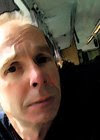This man is Bob McChesney. He's a professor of communications at the University of Illinois at Urbana, a media historian, and a co-founder of Free Press and perhaps the top media activist in the United States.
I first learned about Bob McChesney back around 2002-2003. I kept seeing his name pop up when I searched for information on media criticism. I understood that something was askew with the news media in the U.S., but I couldn't put my finger on exactly what it was. So when I first listened to a lecture he gave for the Mountain Area Information Network, lo and behold, it was like the clouds lifted and the sun broke through. It was powerful. Bob McChesney's understanding of the problem of American journalism, it's history and role in democracy, is vast and compelling, and something about his offhanded, sensible Midwestern style, just got through to me. It all started to come together, and I began to understand that the U.S. media have a number of biases stemming from their place in the U.S. class structure, their obsession with ratings, their political ties and so forth.
Since then I've listened to that lecture and the accompanying interview with MAIN's Wally Bowen at least 8 times. Each time I learn something, some historical detail or enlightening perspective on the media that I didn't have before. That lecture's so packed.
For years before I heard and read Bob McChesney and began to understand where he's coming from, I had my criticisms of the media and their bias, but I could never quite put my finger on what they were doing. I wasn't clear on what the game was and the rules were. I think I tried to see the bias in the news media in terms of Democrat vs. Republican, as many progressives and liberals do today, but that model often didn't fit. McChesney made me see how the bottom line was usually power and the media's constant protection of the powerful and wealthy.




